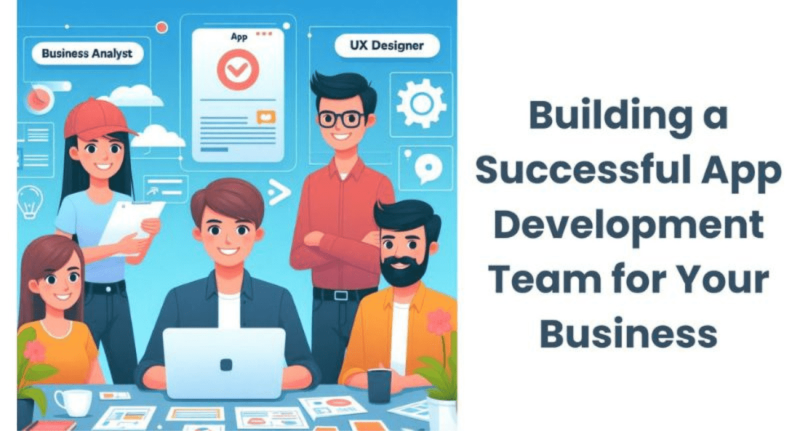Building a successful app development team is a cornerstone of digital business triumph. This blog post explores key considerations, from understanding business requirements to assembling a diverse team with roles such as Product Managers, UX/UI Designers, Mobile app developers, and more. The emphasis is on fostering collaboration, continuous learning, adopting Agile methodologies, and ensuring robust communication channels for optimal success.
Understanding Your Business Requirements:
To kick start the process, it is imperative to have a clear understanding of your business requirements. This involves comprehending the specific features and functionalities your applications need to have to align with your business objectives. A deep dive into the unique aspects of your industry and target audience will provide valuable insights that will guide your app development team throughout the project.
The Importance of a Strong App Development Team For Your Business:
A robust app development team is essential for business success in the digital landscape. Mobile applications play a crucial role in customer engagement, operational efficiency, and revenue generation. Here's why a strong team is vital:
1) Innovation and Creativity:
A skilled team brings fresh ideas and innovative solutions, creating apps that meet current needs and anticipate future trends.
2) Customized Solutions:
An experienced team tailors app solutions to align with specific business requirements, addressing challenges and enhancing customer satisfaction.
3) Efficient Project Management:
Well-organized teams ensure efficient project management, breaking down complex projects, setting realistic timelines, and meeting deadlines for high-quality app delivery.
4) Quality Assurance:
Emphasis on thorough testing at various stages identifies and rectifies bugs, ensuring the final product is reliable, secure, and meets user expectations.
5) Adaptability and Scalability:
Proficient teams create scalable applications that can grow with the business, adapting to changing requirements and technological advancements.
6) Cross-Functional Collaboration:
A successful team comprises professionals with diverse skills, ensuring comprehensive addressing of all aspects of app development.
7) User-Centric Design:
Expertise in UX/UI design focuses on user-centric principles, enhancing app usability for increased satisfaction and engagement.
8) Security Measures:
A dedicated team prioritizes robust security measures to protect user data, safeguard against breaches, and ensure compliance with data protection regulations.
9) Continuous Support and Maintenance:
A strong team provides ongoing support, addressing issues, releasing updates, and ensuring compatibility, enhancing the app's longevity and relevance.
Investing in a strong app development team is essential for a successful digital strategy, resulting in high-quality, tailored applications and positioning the business to thrive in the dynamic digital marketplace.
Identifying Team Roles:
Building an effective app development team involves assembling individuals with diverse skills and expertise to cover various aspects of the development lifecycle.
Here are key roles required for an effective app development team, along with the skills and expertise needed for each role:
(1) Product Manager:
- Strong project management skills
- Understanding of market trends and user needs
- Strategic thinking and decision-making
- Excellent communication and collaboration skills
(2) Project Manager:
- Detailed project planning and organization
- Time management and deadline adherence
- Risk management and problem-solving
- Effective communication and leadership
(3) UX/UI Designer:
- Expertise in design tools like Sketch, Figma, or Adobe XD
- User research and empathy
- Information architecture and wireframing
- Knowledge of current design trends and principles
(4) Mobile App Developer:
- Proficiency in programming languages (e.g., Swift for iOS, Kotlin/Java for Android)
- Cross-platform development skills (e.g., React Native, Flutter)
- Experience with mobile development frameworks
- Debugging and problem-solving abilities
(5) Backend Developer:
- Proficiency in server-side languages (e.g., Node.js, Python, Ruby)
- Database management skills (SQL, NoSQL)
- API development and integration
- Scalability and performance optimization
(6) Frontend Developer:
- Proficiency in web technologies (HTML, CSS, JavaScript)
- Experience with frontend frameworks (React, Angular, Vue.js)
- Responsive design and cross-browser compatibility
- User interface (UI) implementation based on design specifications
(7) Quality Assurance (QA) Tester:
- Test planning and execution
- Knowledge of testing tools and methodologies
- Attention to detail and problem identification
- Collaboration with developers for bug resolution
(8) DevOps Engineer:
- Continuous integration and continuous deployment (CI/CD)
- Monitoring and logging implementation
- Collaboration with development and operations teams
(9) Security Specialist:
- Knowledge of application security best practices
- Experience with security testing tools
- Understanding of encryption and authentication methods
- Compliance with data protection regulations
(10) Scrum Master (Agile Coach):
- Proficiency in Agile methodologies (Scrum, Kanban)
- Facilitation of sprint planning, daily stand-ups, and retrospectives
- Conflict resolution and team motivation
- Continuous improvement mindset
(11) Data Scientist/Analyst (if analytics are a significant component):
- Data analysis and interpretation
- Statistical modeling and machine learning (if applicable)
- Proficiency in data visualization tools
- Collaboration with development and business teams for data-driven decisions
Assembling a team with these key roles and the corresponding skills ensures a well-rounded and capable app development team capable of delivering successful and high-quality applications.
Key Factors to Consider When Assembling Your App Development Team
Assembling an app development team is a crucial step in ensuring the success of your project. Here are key factors to consider for optimal success:
1. Skills and Expertise:
- Ensure your team possesses a diverse set of skills required for your app development, including programming languages, frameworks, design, and testing.
- Consider the specific technologies and platforms your app will use, and ensure your team members have expertise in those areas.
2. Experience:
- Look for team members with relevant industry experience or experience in similar projects. Experienced developers are more likely to handle challenges effectively.
3. Team Composition:
- Build a well-balanced team with roles such as developers, designers, testers, and project managers.
- Consider the size of your team and ensure it is scalable based on the project's requirements.
4. Communication and Collaboration:
- Strong communication skills are essential for effective collaboration within the team. Foster an environment where team members can openly share ideas and concerns.
- Consider time zones and cultural differences if your team is distributed.
5. Project Management:
- Appoint an experienced project manager who can oversee the development process, set goals, and ensure deadlines are met.
- Implement an effective project management methodology (e.g., Agile, Scrum) to enhance productivity and flexibility.
6. Adaptability:
- Ensure your team is adaptable to changes in project scope, technology, or market conditions.
- Foster a culture of continuous learning to keep up with the latest industry trends and technologies.
7. Quality Assurance and Testing:
- Dedicate resources to quality assurance and testing to identify and fix issues early in the development process.
- Implement automated testing processes to improve efficiency and reduce the risk of bugs.
8. User-Centric Approach:
- Include UX/UI designers who can focus on creating a user-friendly interface and ensuring a positive user experience.
- Conduct user testing and gather feedback throughout the development process to make necessary improvements.
9. Scalability and Future Maintenance:
- Consider the long-term scalability and maintenance of the app. Build a team that can support ongoing updates, improvements, and potential growth.
10. Security:
- Integrate security experts into your team to address potential vulnerabilities and ensure the protection of user data.
- Implement secure coding practices and conduct regular security audits.
11. Budget and Resources:
- Assess your budget and allocate resources efficiently. Consider the cost of hiring skilled professionals versus outsourcing certain tasks.
12. Passion and Commitment:
- Look for team members who are passionate about the project and committed to its success. A motivated team is more likely to overcome challenges and deliver high-quality results.
By carefully considering these factors, you can build a well-rounded and effective app development team for optimal success.
Conclusion:
Building a successful app development team involves understanding business requirements, identifying key roles, fostering collaboration, continuous learning, adopting Agile methodology, and implementing robust communication channels. Assembling a team with diverse skills, industry experience, and a passion for success is crucial for optimal results.
About Author: Sanjay Panchal
Sanjay Panchal, Director of IIH Global, a leading UK-based custom software and mobile app development company, thrives on turning innovative ideas into cutting-edge solutions. His passion for excellence drives him to lead his team in delivering high-quality mobile apps, CRM systems, and web applications for a diverse clientele, ranging from agile startups to established enterprises. Sanjay's commitment to exceeding expectations has earned IIH Global a reputation for exceeding expectations and building long-lasting partnerships with its clients.









